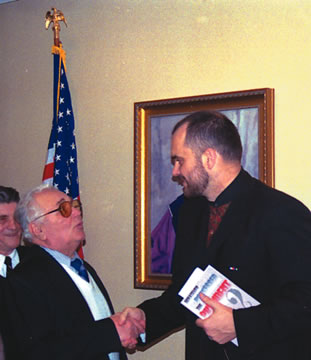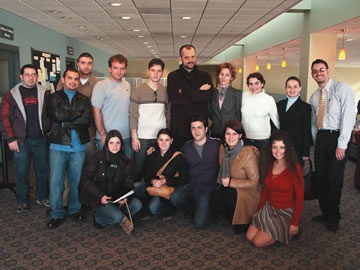On Tuesday, February 25, UMass students and faculty had the privilege of meeting Edi Rama, the mayor of Tirana, Albania as he spoke at an event entitled “Artful Democracy: Urban Planning and Development after Communism.” Mr. Rama was visiting Boston as the recipient of the Robert C. Wood Professorship. The professorship is awarded annually to a distinguished scholar, who is then invited to spend a week visiting classes and give a speech about the efforts they have made to bring unity to their community. Over one hundred people, including Chancellor Jo Ann Gora and award namesake Robert C. Wood, attended the event, which took place in the Chancellor’s Conference room of Quinn.
Choosing Edi Rama as this year’s recipient turned out to be a brilliant decision. Prior to becoming the mayor of post-communist Tirana, Rama was employed as an artist and a professor at the Academy of Arts in Tirana. Upon seeing the polluted, downtrodden state of his community as it struggled to overcome the disastrous effects of communism, Rama said, “It seemed more noble to leave my paintings and do something greater.” Since making that decision, Edi Rama has implemented plans that have reduced pollution, unemployment, and crime, even as Tirana’s population increased from 250,000 to 650,000 in a matter of ten years.
However, Mr. Rama did not abandon his love of art as he pursued these goals. In fact, he utilized it. In an effort to build confidence and pride in the city of Tirana, Mr. Rama undertook the task of transforming areas of the city. These tasks included restoring local buildings by painting the buildings in upbeat, bold colors such as red, yellow and green. Other accomplishments included renovating an area park from swamp-like area to well-manicured with winding sidewalks, restoring city hall from a dilapidated building into a beautifully painted structure with marble floors and chandeliers, and creating indoor information kiosks with computer access where previously citizens were forced to stand outside, regardless of weather, in an effort to obtain information.
Particularly inspiring were the pictures taken of the Clean and Green project. The purpose of this project was to demolish all of the illegal buildings built on either bank of the Lana River, which flows through the city. The presence of the buildings caused the river to be so polluted that the stench associated with crossing the bridge over the river, disgusted citizens. Not only did Mr. Rama restore structures that existed prior to his office term, he created new ones. One such building was the Municipal Council Meeting Room. Prior to the construction of this building, the fifty-five members of the council were forced to find cafes and hotel rooms in which to meet.
The effects of this restoration are inspiring. As Mr. Rama stated, “The quality of the environment can be more effective against criminality and pollution than the presence of many police.” He then proceeded to describe how areas once rife with drug dealers now consist of shops and cafes where the public feels comfortable and safe. Also, in an effort to maintain the pristine landscape of their community, citizens of Tirana are themselves more environmentally conscientious and no longer litter. And as a result of having an unchanging place of meeting in the new Municipal Council Meeting Room, both the government and citizens feel more secure and stable. The overall effect of the efforts undertaken by Mr. Rama has been renewed trust and confidence in the fledgling government as it takes steps to improve the public’s way of life
In addition to his unique approach at politics, one of Edi Rama’s most refreshing qualities was his frankness. He conceded that there is still much work to be done before Tirana is fully restored and that the pictures shown do not represent the appearance of the entire city. He also admits that it will be a long and grueling process as presently, “Our needs exceed our potential.”






















































